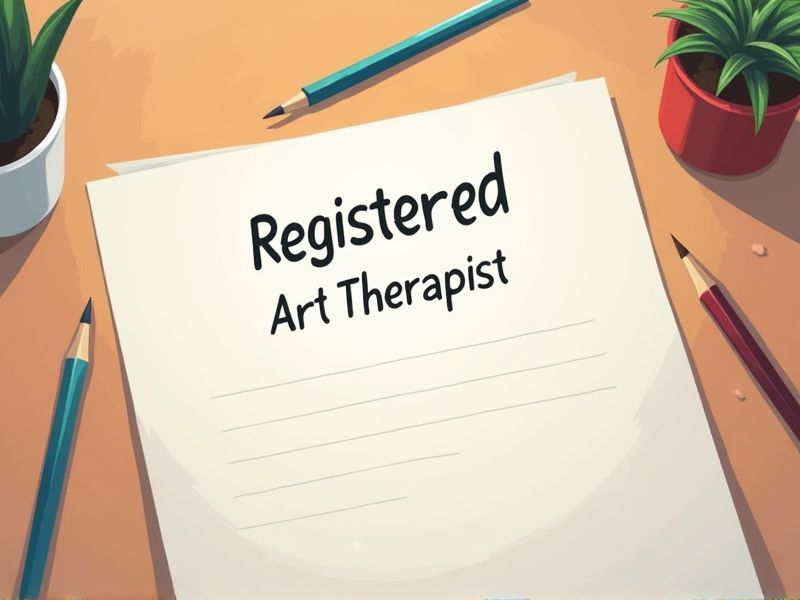
Becoming a Registered Art Therapist requires specialized knowledge and skills to effectively integrate psychotherapy with the creative process of art-making. Certifications ensure that therapists meet necessary standards of competence and adhere to ethical practices within the field. These credentials demonstrate proficiency in therapeutic techniques, psychological theory, and the use of art as a communicative tool. Here are some important certifications required for a Registered Art Therapist.
Registered Art Therapist (ATR)
The presence of a Registered Art Therapist (ATR) ensures standardized and evidence-based therapeutic approaches in art therapy, enhancing client outcomes. With specialized training, ATRs can effectively guide individuals in using creative processes to address mental health issues, fostering psychological healing. Holding the ATR credential indicates adherence to professional ethics and continuous professional development, maintaining a high level of accountability and expertise in the practice. These professionals meet regulatory requirements, which reassures clients and institutions of their competency and commitment to the therapeutic profession.
Board Certified Art Therapist (ATR-BC)
Obtaining the ATR-BC credential enhances an art therapist's professional credibility, as it signifies adherence to rigorous national standards. The certification process involves a comprehensive exam that ensures practitioners possess the necessary skills and knowledge. Employers often prefer or require board certification, as it demonstrates commitment to maintaining high industry standards. Board certification provides access to a broader network of professionals and continuing education opportunities, fostering career advancement.
Licensed Professional Counselor (LPC)
A Licensed Professional Counselor (LPC) provides foundational knowledge in psychotherapeutic techniques, essential for effective art therapy practices. Access to the LPC credential allows registered art therapists to legally diagnose and treat mental health disorders, enhancing their professional scope. Credentialing ensures adherence to ethical guidelines, fostering trust and credibility among clients and colleagues. LPC's integration with art therapy techniques provides a comprehensive approach, improving client outcomes by addressing both emotional and psychological needs.
Licensed Clinical Social Worker (LCSW)
A Registered Art Therapist may encounter clients with complex emotional and mental health issues, necessitating collaboration with a Licensed Clinical Social Worker (LCSW) to ensure comprehensive treatment. The LCSW provides expertise in mental health diagnosis and therapeutic intervention strategies, enhancing the therapeutic process. Their knowledge of social justice and systemic factors supports a holistic understanding of the client's environment. Collaborative care between an LCSW and a Registered Art Therapist leads to more effective treatment outcomes.
Licensed Marriage and Family Therapist (LMFT)
Registered Art Therapists often work with families and couples, and having LMFT training enhances their ability to navigate complex relational dynamics. Including LMFT skills in their therapeutic approach allows them to address deeper psychological issues that may impact family systems. This dual expertise equips them to better facilitate communication and healing within a family context. The overlap of art therapy with LMFT principles often results in more comprehensive care plans that address both emotional and relational aspects.
Registered Play Therapist (RPT)
Registered Play Therapist (RPT) expertise enhances the therapeutic skills of a Registered Art Therapist by integrating play-based techniques with art interventions. This combination can lead to more effective sessions for clients who express themselves better through play and visual art. Understanding play therapy can help art therapists to communicate more effectively with children who may not have the verbal capacity to articulate their feelings. The skills gained from RPT can provide a broader therapeutic toolkit, benefiting clients who need more diverse therapeutic interventions.
Certified Expressive Arts Therapist (CEAT)
Registered Art Therapists often focus on visual arts, whereas a Certified Expressive Arts Therapist brings in a broader range of creative modalities, like music, dance, and drama, enhancing therapeutic depth. This expanded toolkit can lead to more comprehensive treatment plans, especially for clients who respond better to non-verbal forms of expression. The integration of expressive arts can facilitate breakthroughs in clients with trauma or communication challenges by providing alternative pathways for self-exploration. Certified Expressive Arts Therapists can also appeal to diverse populations, thereby increasing accessibility and inclusivity in therapeutic services.
Certified Creative Arts Therapist (CCAT)
Registered Art Therapists seeking the title of Certified Creative Arts Therapist (CCAT) often do so to enhance their professional credibility, attracting clients and gaining trust in therapeutic settings. The CCAT credential typically involves rigorous training and standardized examination, ensuring that therapists meet high clinical and ethical standards. Possessing a CCAT designation may open doors to advanced career opportunities and increase earning potential. Such certification also aligns with ongoing professional development, promoting specialized skills in creative therapeutic interventions for diverse populations.
Trauma-Focused Cognitive Behavioral Therapy (TF-CBT) Certification
Trauma-Focused Cognitive Behavioral Therapy (TF-CBT) Certification enables registered art therapists to integrate evidence-based trauma treatment methods into their practice, enhancing therapeutic outcomes. This certification provides structured protocols that specifically address the needs of clients experiencing trauma, which may enhance the efficacy of art therapy interventions. By acquiring TF-CBT Certification, art therapists gain a deeper understanding of trauma's impact on the brain, fostering more informed treatment strategies. The certification also offers credibility and may open new professional opportunities, reflecting a therapist's commitment to specialized and effective client care.
Certified Clinical Mental Health Counselor (CCMHC)
A Certified Clinical Mental Health Counselor (CCMHC) possesses advanced competencies in providing comprehensive mental health services, which enhances the therapeutic impact of a Registered Art Therapist. Art therapy often involves addressing complex psychological conditions, and a CCMHC's specialized skills in diagnostics and intervention ensure more effective treatment outcomes. The regulatory standards and ethical guidelines adhered to by a CCMHC add a layer of professional credibility and adherence to best practices. The collaboration between a CCMHC and a Registered Art Therapist facilitates a holistic approach, merging evidence-based counseling techniques with creative therapeutic methods.
Summary
By obtaining additional certifications, you can significantly enhance your credibility and professional standing as a Registered Art Therapist. This leads to increased trust and opportunities from clients and organizations seeking expert art therapy services. With these qualifications, your skills are perceived as more specialized, potentially expanding your client base and scope of practice. These certifications can also facilitate career advancement and salary growth by demonstrating a commitment to continued education and expertise.
